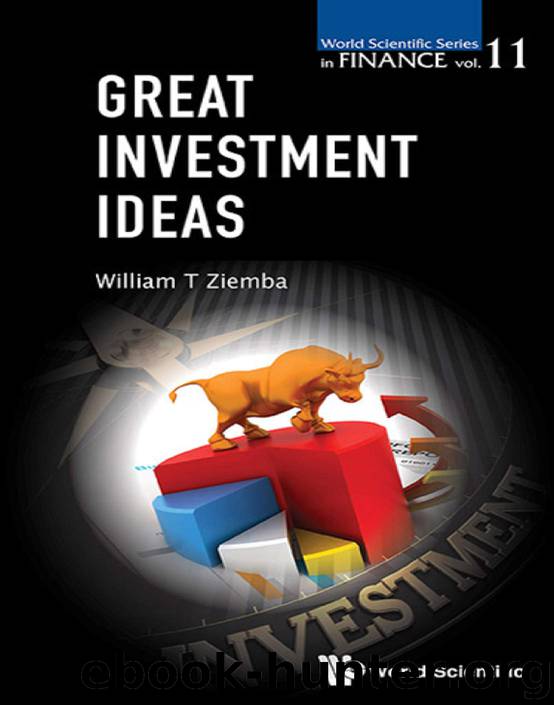Great Investment Ideas: 9 (World Scientific Series in Finance) by William T Ziemba

Author:William T Ziemba [Ziemba, William T]
Language: eng
Format: azw3
ISBN: 9789813144392
Publisher: Wspc
Published: 2016-09-07T16:00:00+00:00
References
Aron, P. (1981). Are Japanese P/E Multiples Too High?. Daiwa Securities of America, New York.
Asness, C. (2000). Stocks versus bonds: Explaining the equity risk premium. Financial Analysts Journal, March/April, 96–113.
Asness, C. (2003). Fight the fed model: The relationship between future returns and stock and bond market yields. Journal of Portfolio Management (Fall), 11–24.
Berge, K., Ziemba, W. T. (2006). The predictive ability of the bond stock earnings yield differential in US and foreign markets, 1970–2005. Working paper, University of British Columbia.
Bleiberg, S. (1989). How little we know … about P/Es, but also perhaps more than we think. Journal of Portfolio Management, 15, 26–31.
Campbell, J. Y. (1987). Stock returns and the term structure. Journal of Financial Economics 18, 373-399.
Campbell, J. Y. (1990). Measuring the persistence of expected returns. American Economic Review Papers and Proceedings, 80, 43–47.
Campbell, J. Y. (1993). Intemporal asset pricing without consumption data. American Economic Review, 83, 487–512.
Campbell, J. Y. and Ammer, J. (1993). What moves the stock and bond markets? A variance decomposition for long-term asset returns. Journal of Finance, 48, 3–37.
Campbell, J. Y. and Shiller, R. J. (1988). Stock prices, earnings, and expected dividends. Journal of Finance, 43, 661–676.
Campbell, J. Y. and Shiller, R. J. (1998). Valuation ratios and the long-run stock market outlook. Journal of Portfolio Management, 24(2), 11–26.
Campbell, J. Y. and Shiller, R. J. (2005). Valuation ratios and the long-run stock market outlook: an update, in R.H. Thaler (ed), Advances in Behavioral Finance, Volume II. pp. 173–201. Princeton, NJ: Princeton University Press.
Campbell, J. Y. and Thompson, S. B. (2005). Predicting the equity premium out of sample: can anything beat the historical average? Review of Financial Studies (forthcoming).
Campbell, J. Y. and Vuolteenaho, T. (2004). Inflation illusion and stock prices. American Economic Review, Papers and Proceedings 94 (May), 19–23 and abstracted in Arrowstreet Journal, 5(2), 1.
Campbell, J. Y. and Yogo, M. (2006). Efficient tests of stock return predictability, Journal of Financial Economics, 81, 27–60.
Consigli, G. (2002). Tail estimation and mean-variance portfolio selection in markets subject to financial instability. Journal of Banking and Finance, 26(7), 1355–1382
Consigli, G., MacLean, L. M., Zhao, Y., and Ziemba, W. T. (2006). Speculative bubbles: Asset prices with yield dependent market corrections. Working paper, University of Bergamo.
Constantinides, G. M. (1990). Habit formation: A resolution of the equity premium puzzle. Journal of Political Economy, 98, 519–543.
De Long, J. B., Sheifer, A., Summers, L. H., Waldmann, R. J. (1990). Noise trader risk in financial markets. Journal of Political Economy, 98(4), 703–738.
Dimson, E., Marsh, P. R., and Staunton, M. (2006a). Global Investment Returns Yearbook, ABN Amro, London School of Business School.
Durré, A., Giot, P., 2005, An international analysis of earnings, stock prices and bond yields, Working Paper, European Central Bank, Frankfurt (May).
Fama, E. F. (1970). Efficient capital markets: a review of theory and empirical work. Journal of Finance, 25, 383–417.
Fama, E. F. (1991). Efficient capital markets: II. Journal of Finance, 46, 1575–1617.
Fama, E. F. (1998). Market efficiency, long-term returns, and behavioral finance. Journal of Financial Economics, 49, 283–306.
Fama, E. F. and French, K. R. (1988a). Dividend yields and expected stock returns.
Download
This site does not store any files on its server. We only index and link to content provided by other sites. Please contact the content providers to delete copyright contents if any and email us, we'll remove relevant links or contents immediately.
Rich Dad Poor Dad by Robert T. Kiyosaki(6576)
Pioneering Portfolio Management by David F. Swensen(6275)
How To Win Friends and Influence People by Dale Carnegie(4492)
The Money Culture by Michael Lewis(4174)
The Dhandho Investor by Mohnish Pabrai(3741)
The Wisdom of Finance by Mihir Desai(3720)
Liar's Poker by Michael Lewis(3432)
Fooled by Randomness: The Hidden Role of Chance in Life and in the Markets by Nassim Nicholas Taleb(3091)
The ONE Thing by Gary Keller(3051)
The Intelligent Investor by Benjamin Graham Jason Zweig(3031)
Mastering Bitcoin: Programming the Open Blockchain by Andreas M. Antonopoulos(3029)
Rich Dad Poor Dad: What The Rich Teach Their Kids About Money - That The Poor And Middle Class Do Not! by Robert T. Kiyosaki(2940)
The Psychology of Money by Morgan Housel(2937)
How to Day Trade for a Living: Tools, Tactics, Money Management, Discipline and Trading Psychology by Andrew Aziz(2932)
Investing For Dummies by Eric Tyson(2931)
How to Win Friends and Influence People by Dale Carnegie(2897)
Market Wizards by Jack D. Schwager(2685)
Zero Hour by Harry S. Dent Jr. & Andrew Pancholi(2639)
How to Pay Zero Taxes, 2018 by Jeff A. Schnepper(2635)
